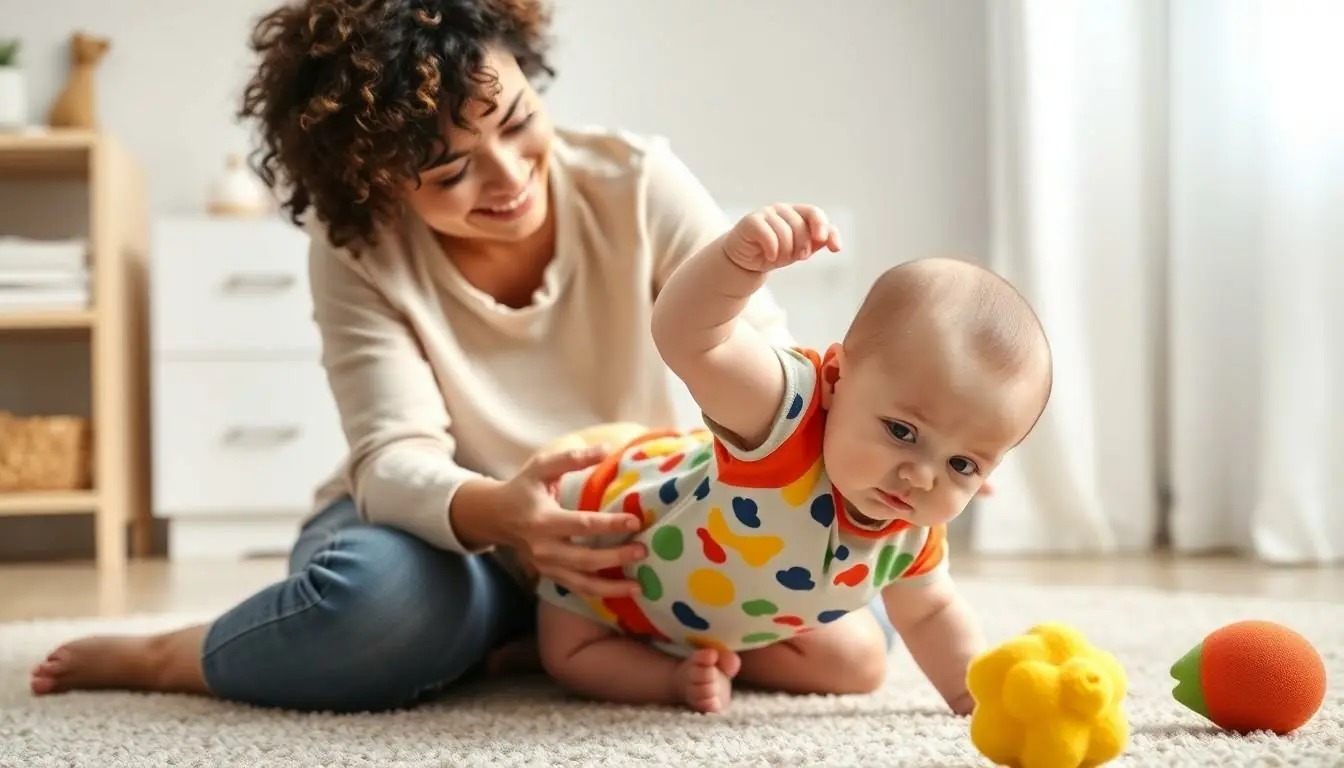Every parent knows the joy of welcoming a tiny bundle of joy into their lives. But as those sleepless nights roll on, the question inevitably pops up: when do babies stop being newborns? Spoiler alert: it’s not just when they start sleeping through the night (though that would be nice).
Table of Contents
ToggleUnderstanding Newborn Development
Newborn development encompasses critical stages in a baby’s early life. Recognizing milestones helps parents understand when their child transitions from a newborn into the next growth phase.
Definition of Newborn Stage
A newborn typically refers to an infant aged 0 to 28 days. This stage marks significant growth and adaptation to life outside the womb. Medical professionals often utilize this timeframe to monitor crucial developments. After 28 days, babies usually enter the infant stage. The transition signifies a period of enhanced physical and neurological growth.
Key Characteristics of Newborns
Newborns exhibit several distinct characteristics. They typically sleep for up to 16 to 20 hours each day, with sleep cycles largely dominated by REM periods. Reflexes such as the rooting and grasping reflex are prominent, demonstrating instinctual behaviors. The average weight at birth ranges from 5.5 to 8.8 pounds, while length measures between 18 to 22 inches. Newborns primarily communicate through crying to express their needs, whether for food, comfort, or attention. Understanding these traits aids parents in caring for their newborn effectively.
Milestones in Baby Development

Understanding baby development milestones offers insight into transitioning from the newborn stage. Recognizing these changes helps parents support their child’s growth.
Physical Milestones
Physical milestones occur within the first few months, significantly impacting development. Babies typically begin lifting their heads at two months. By four months, many can roll over, showcasing increased muscle strength. Grasping small objects becomes evident by five to six months as hand-eye coordination improves. Babbling starts around six months, further showing coordination between physical and vocal skills. During this time, babies often double their birth weight, reaching an average of about 14 pounds by six months. Notable growth is also seen in height, with many infants gaining around 1 to 1.5 inches monthly during these early stages.
Cognitive and Emotional Development
Cognitive and emotional development features observable changes in behavior and interaction. At approximately two months, babies recognize familiar faces and voices, fostering emotional connections. By four months, interest in their surroundings intensifies, leading to engagement with toys and people. Developing social smiles becomes common, indicating emotional growth. By six months, many babies exhibit preference for specific caregivers, showcasing attachment and emotional awareness. Parallel play with nearby children begins around this time as well, providing opportunities for social learning. Understanding these milestones supports parents in nurturing their child’s cognitive and emotional development effectively.
When Do Babies Stop Being Newborns?
Newborns typically transition to the infant stage starting at about 28 days after birth. This period signifies a crucial development phase for babies.
Age Range for Newborns
Newborns are classified as babies aged 0 to 28 days. During this time, they undergo rapid growth and adaptation to their new environment. Various developmental changes occur, including weight gains and improved motor skills. Parents often notice that their baby’s physical attributes change significantly within this timeframe, making it essential to monitor growth patterns closely. After 28 days, babies are considered infants, marking a shift to a phase characterized by further developmental milestones.
Factors Influencing Transition
Several factors affect when babies stop being newborns. Growth rates, individual health, and developmental milestones play critical roles. Some babies reach certain physical or cognitive benchmarks earlier than others, impacting their progression to the infant stage. Parenting styles and environmental influences can also contribute to the transition. Additionally, variations in sleep patterns and social engagement can signal a baby’s readiness to move beyond the newborn phase. Understanding these factors helps parents support their child’s growth effectively.
Signs Your Baby Is Transitioning
Transitioning from a newborn to the infant stage involves noticeable changes in behavior and growth patterns.
Changes in Behavior
Babies display increased alertness during their second month. They begin to spend more time awake and engaged with their environments. During this period, babies also show heightened interest in social interactions. Smiling in response to caregivers becomes more common. By four months, they typically express excitement through cooing or laughter. Engaging with toys and exploring textures occurs frequently. Additionally, signs of attachment start appearing, as they recognize familiar faces and exhibit preferences for primary caregivers.
Growth Patterns
Rapid development characterizes this growth phase. Weight gain often accelerates, with many babies tripling their birth weight by six months. Length also increases significantly, as they may add several inches to their height. Growth spurts are common during this time, with periods of increased feeding. Milestones like rolling over and grasping objects emerge around two to six months. Neurologically, babies develop coordination, which aids in exploring their surroundings. By six months, many babies can sit independently for short periods, indicating strong core muscle development.
Understanding when babies stop being newborns is crucial for parents navigating this exciting yet challenging period. The transition from newborn to infant is marked by significant milestones in physical and cognitive development. As babies grow more alert and engaged with their surroundings they begin to show distinct signs of this change.
Recognizing these milestones helps parents provide the right support and care. Each baby develops at their own pace influenced by various factors such as health and environment. By paying attention to these developmental cues parents can celebrate their child’s growth and nurture their journey toward becoming a thriving infant.

